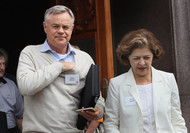Jacobus Petrus “Koos” Bekker became a billionaire earlier this year after transforming Cape Town, South Africa-based Naspers Ltd. (NPN) from a decades-old print business into the world’s largest emerging market media company.
Formed in 1915 as De Nasionale Pers, the company published what became South Africa’s first Afrikaans-language daily newspaper, Die Burger, which went on todefend apartheid rule in commentaries and articles when the segregationist system was put in place, beginning in 1948.
Naspers Chief Executive Officer Jacobus Petrus “Koos” Bekker is seen with his wife Karen Bekker in July, 2011, in Sun Valley, Idaho. Photographer: Scott Olson/Getty Images
The headquarters of Naspers Ltd., left, stand in Cape Town. Photographer: Nadine Hutton/Bloomberg
Bekker, the company’s 60-year-old chief executive officer, took control of the group in 1997 and began investing in technology and media companies, according to BPI Africa Capital analyst Kate Turner-Smith. Buying stakes in more than 100 businesses, including China’s Tencent Holdings Ltd. (700) and Russia’s Mail.ru (MAIL), Bekker turned Naspers into an investment house that has added almost $34 billion in market value since 2003.
“The company has changed 180 degrees,” Turner-Smith said in a phone interview on Aug. 5. “Koos Bekker is quite a visionary guy. He saw the writing on the wall with print media long before most of the market did and started investing in Internet businesses.”
Bekker takes his compensation in stock alone, and controls almost 4 percent of Naspers through a combination of 11.7 million share options he holds directly and a 1.1 percent stake held by a family trust. Measured in local currency, Naspers shares have risen 30-fold since 2003, making it the best-performing stock on theJohannesburg Stock Exchange, and pushing up the value of Bekker’s personal holdings in the company to $1.2 billion.
Babylonstoren Estate
With his wife, Karen, he also owns Babylonstoren, a 494-acre (200 hectare) farm, winery and luxury hotel about 37 miles (60 kilometers) northeast of Cape Town. The property is valued using information provided by two local real estate agents familiar with the property and its history. Local property records show he bought the estate in 2007 for 35 million rand.
Through a company spokeswoman, Meloy Horn, Bekker declined to comment on his net worth.
Naspers had 50.2 billion rand ($4.9 billion) in revenue in the fiscal year ended March 31, 2013, 60 percent of which came from pay television. More than 6.7 million households from South Africa to Nigeria paid to watch content on Naspers’ broadcaster, Supersport, including soccer’s English Premier League and Formula 1 car races.
TV Thesis
The Potchefstroom, South Africa-born Bekker focused his thesis at Columbia Business School in the 1980s on pay-television businesses, such as Time Warner Inc. (TWX)’s HBO, then an emerging business model.
In Sub-Saharan Africa, Supersport is the largest broadcaster of soccer matches in Africa, according to Horn, a boon in a region with millions of fans, including Bekker, who was a member of South Africa’s 2010 FIFA World Cup organizing committee.
After graduating from Columbia in 1984, Bekker returned to South Africa, where he recruited several media companies, including the Naspers publishing house, to serve as one of the founding shareholders of M-Net, a pay-television company.
M-Net sold shares on the Johannesburg Stock Exchange in 1990, and was delisted and consolidated under Naspers after Bekker was named CEO in 1997.
Emerging Markets
Four years later, Bekker made one of his early emerging market investments, buying half of Shenzen, China-based Tencent, now the country’s biggest Internet company, for $32 million.
The stake was diluted to 34 percent after Tencent’s 2004 listing on the Hong Kong stock exchange and the introduction of a share incentive plan, and represents about 80 percent of Naspers value, according to Turner-Smith.
Tencent’s stock has soared 49 percent year-to-date, defying an 11 percent drop in the MSCI Emerging Markets Index, and a 1 percent decline in the Hang Seng Index (HSI), in the same period. Naspers shares are up 58 percent since January.
“Naspers and Tencent are almost identical,” said Turner-Smith, referring to performance of the company’s shares. “Bekker’s wealth is effect and the cause is Tencent. He was a smart guy; he had his finger on the button very early.”
To contact the reporters on this story: Christopher Spillane in Johannesburg at cspillane3@bloomberg.net; Devon Pendleton in New York at dpendleton@bloomberg.net
To contact the editor responsible for this story: Matthew G. Miller at mmiller144@bloomberg.net



Comment here
You must be logged in to post a comment.